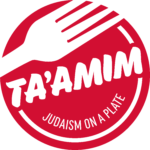Apple, Carrot and Beetroot Muffins

Three Rosh Hashana Simanim come together in one beautifully moist, sweet and delicate bite. These muffins are even reasonably healthy, as cakes go, sweetened with honey rather than refined sugar, and made with olive oil in place of butter or margarine. They’re also a sneaky way of getting kids (or fussy grown ups) to eat their fruit and veggies! A tasty dessert, snack or breakfast-on-the-go, this is a recipe you’re sure to be coming back to again and again, and make an excellent homemade Mishloach Manot treat for Purim.
Chocolate-dipped Honeycomb

This recipe is pure, sweet indulgence. True honeycomb, of the bee-made variety, is one of the Simanim, has multiple health benefits and is emblematic of the bees on which the harvest relies, but these chocolate dipped treats are somewhat less healthy and despite what the name suggests, they contain no honey whatsoever! They are, however, delicious and the combination of crunchy honeycomb and rich, dark chocolate is a winner, sure to bring a smile to the faces of friends and family as they ask for a sweet and good new year.
Caramelised Apple with Honeycomb Ice Cream

A contemporary spin on the iconic Rosh Hashanah offering of apple and honey, this dessert is the perfect way to round off an autumn evening. Our baked apples are caramelised in honey and served warm, alongside a delicious homemade parev ice cream, sweet and full of crunchy honeycomb crumbs. We used Granny Smith apples for their tartness to balance the sweetness of the ice cream, but you can use any other apple of your choosing.
Pea, Courgette and Caramelised Onion Salad
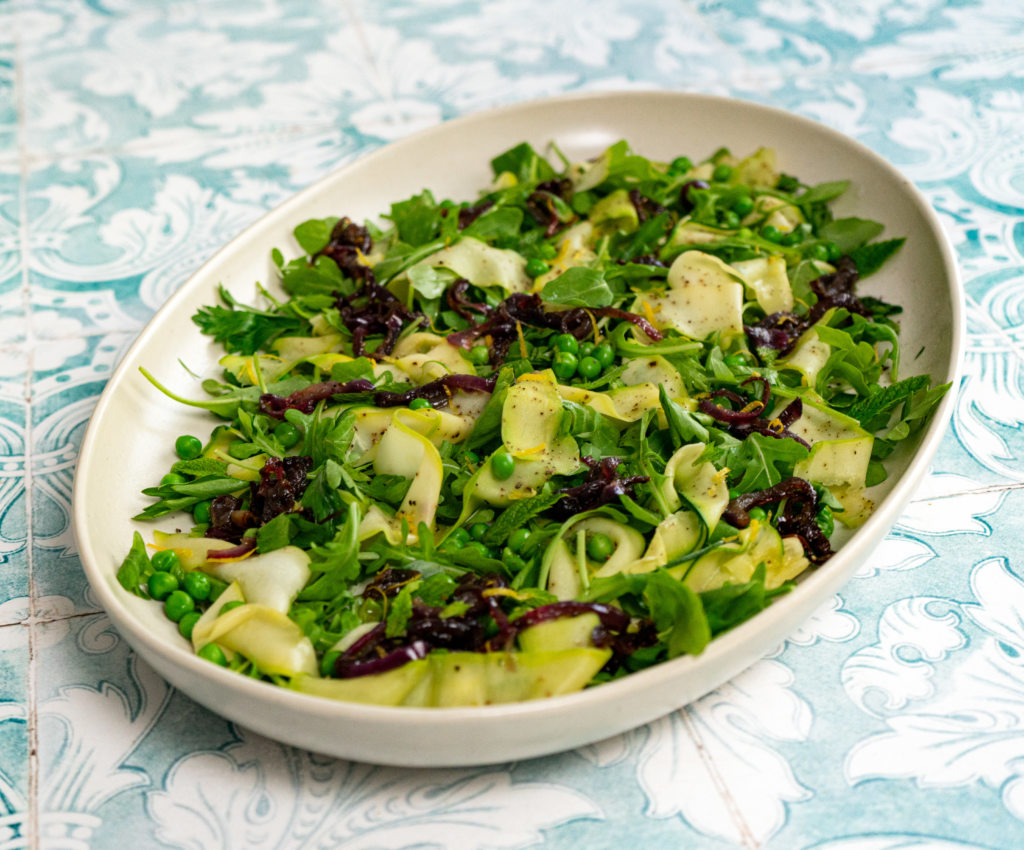
A seasonal and refreshing accompaniment to meat, chicken, dairy or fish meals, which also gives a nod to the Simanim with the inclusion of gourds in the form of courgette and the sweetness of honey-caramelised onions. A great base for a light lunch with whatever protein you prefer, this vibrant green salad is fantastic for lunchboxes and a delicious choice for a Shabbat, Yom Tov or any day of the week! If you’re making this salad for Rosh Hashanah, add baby leaf spinach or swiss chard for an extra Siman boost.
One-pot Baharat Chicken and Mejadra-Stuffed Peppers
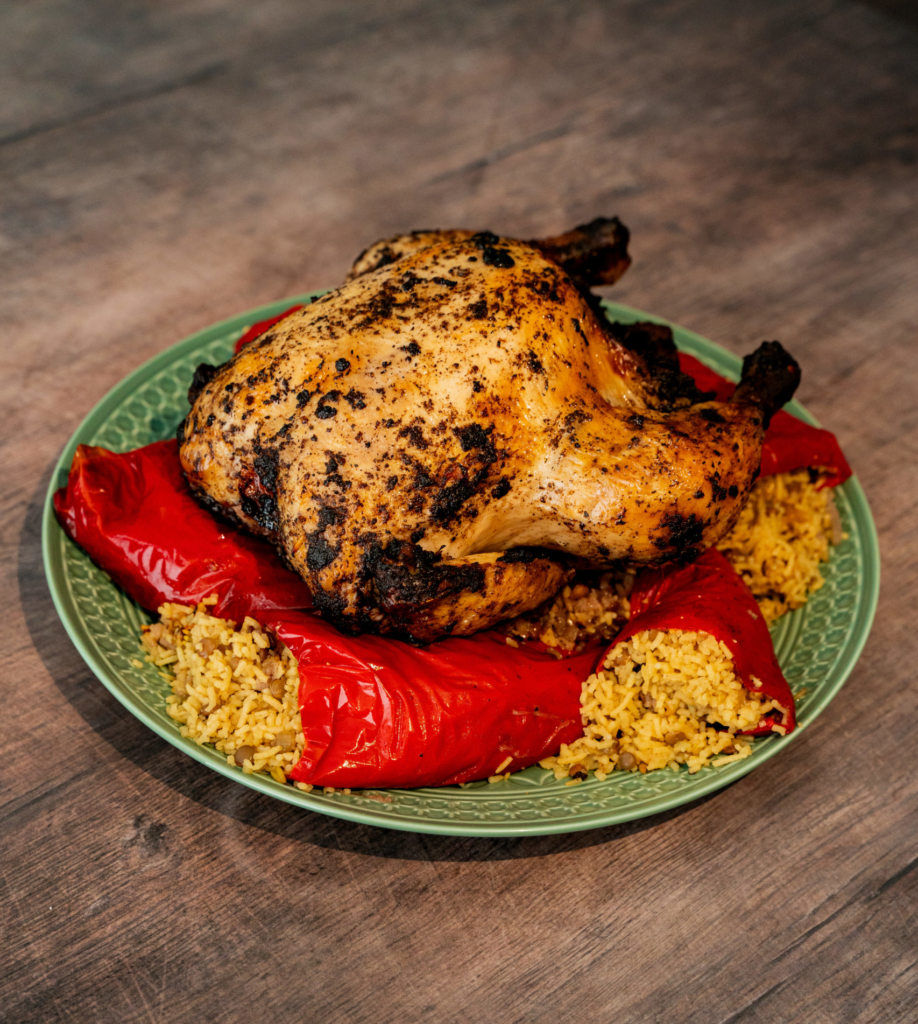
Mejadra (or Mujadarra) is a dish eaten widely all over the Levant, and commonly seen at Sukkot because of its seasonality, its “jewelled” nature, and for the simple practical reason that it could be easily transported in a single pot from the kitchen to the Sukkah! Fragrant spiced rice with lentils and onions, its symbolism can be elevated still futher by stuffing the mejadra inside sweet peppers. To complete this show-stopping one-pot dish, we pack our stuffed peppers around a whole chicken rubbed with an aromatic baharat spice mix, allowing the delicious spiced juices to infuse the peppers and rice with layers of flavour as they cook.
Moroccan 7-Vegetable Couscous
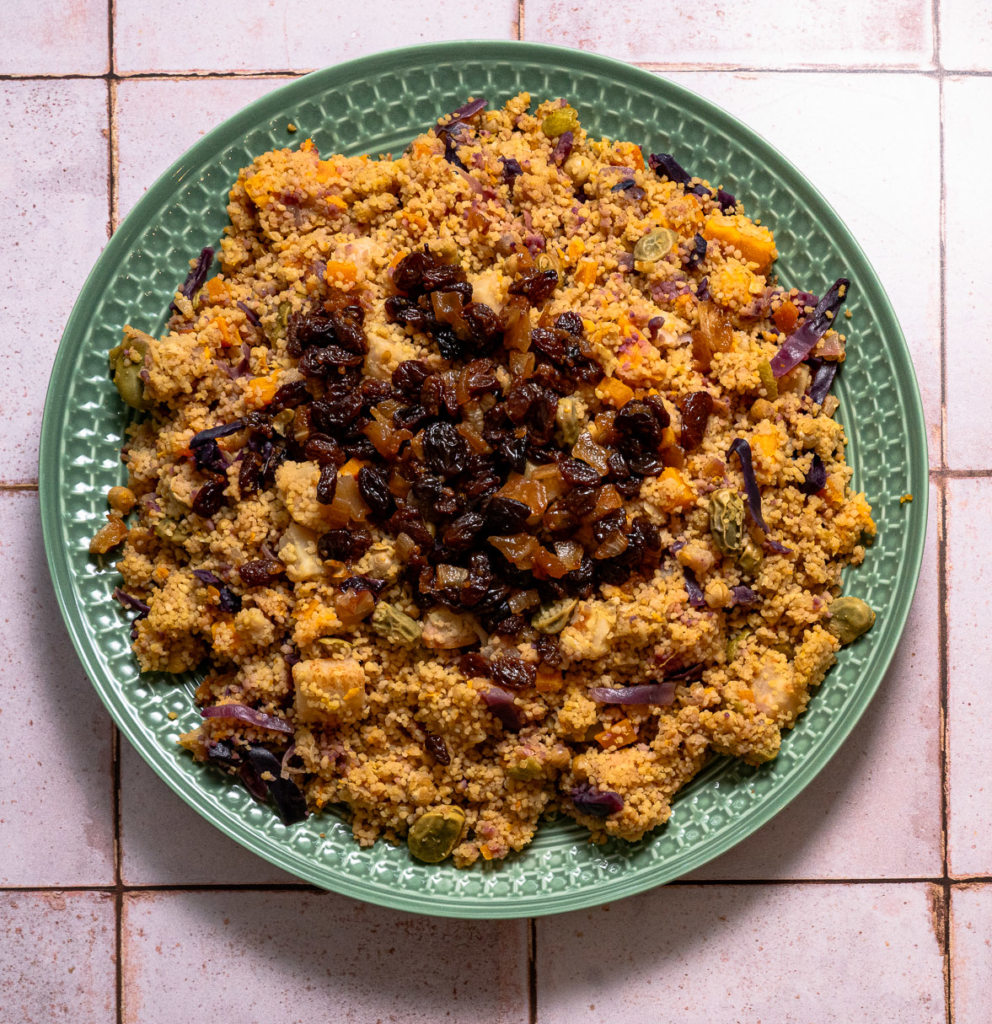
As seasonal as it gets and a celebration of Simanim, the earthiness of the root vegetable mash, rich with parsnip, potatoes and sweet potatoes exquisitely complements these deliciously tender and sweet ribs, which are marinated in pomegranate molasses and date honey, both Simanim, omens for abundant blessings and redemption from our enemies. The greens are the finishing touch on a perfectly rounded Autumn warmer, just what’s needed as those shorter nights start drawing in. Leafy greens (swiss chard, spinach or beetroot leaves) are another of the Simanim – ‘silka’ in Aramaic or ‘selek’ in Hebrew, related to the Hebrew word ‘silek’ (to depart). We ask that Hashem remove our adversaries from us in the coming year. Ifcooking this dish for Rosh Hashanah, you may also choose to add squash to the mash and leeks to the greens to add two more Simanim to the dish.
Moroccan Lamb with 7-Vegetable Couscous
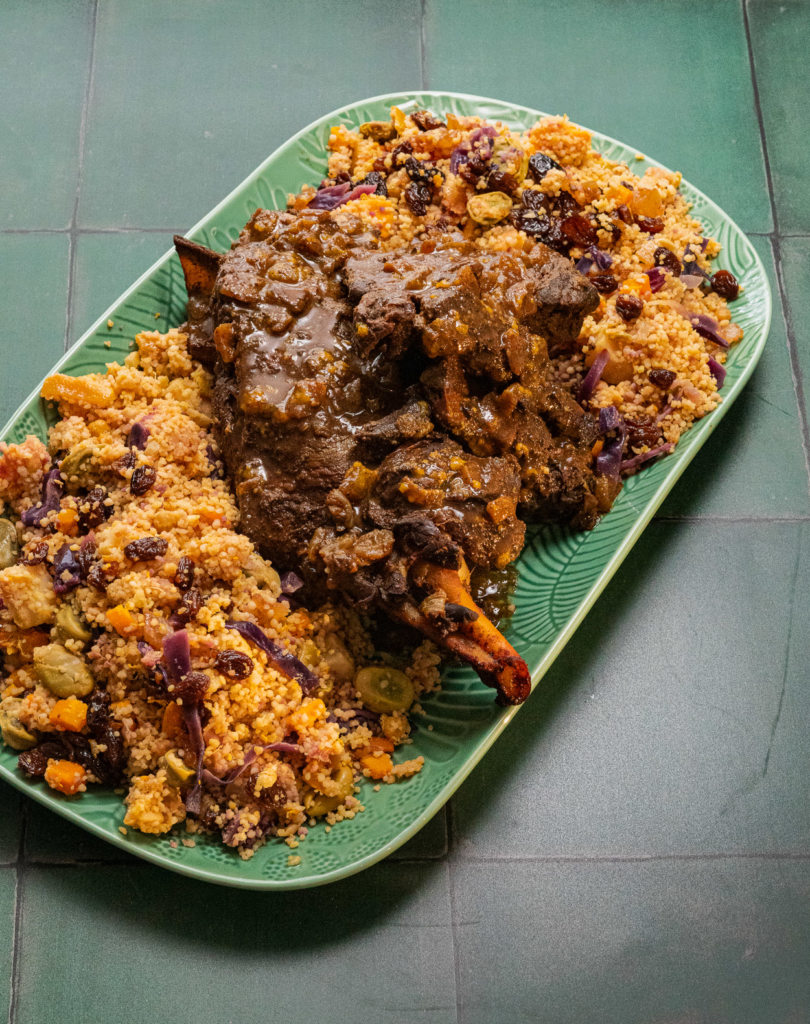
As seasonal as it gets and a celebration of Simanim, the earthiness of the root vegetable mash, rich with parsnip, potatoes and sweet potatoes exquisitely complements these deliciously tender and sweet ribs, which are marinated in pomegranate molasses and date honey, both Simanim, omens for abundant blessings and redemption from our enemies. The greens are the finishing touch on a perfectly rounded Autumn warmer, just what’s needed as those shorter nights start drawing in. Leafy greens (swiss chard, spinach or beetroot leaves) are another of the Simanim – ‘silka’ in Aramaic or ‘selek’ in Hebrew, related to the Hebrew word ‘silek’ (to depart). We ask that Hashem remove our adversaries from us in the coming year. Ifcooking this dish for Rosh Hashanah, you may also choose to add squash to the mash and leeks to the greens to add two more Simanim to the dish.
Sweet Potato and Squash Chips
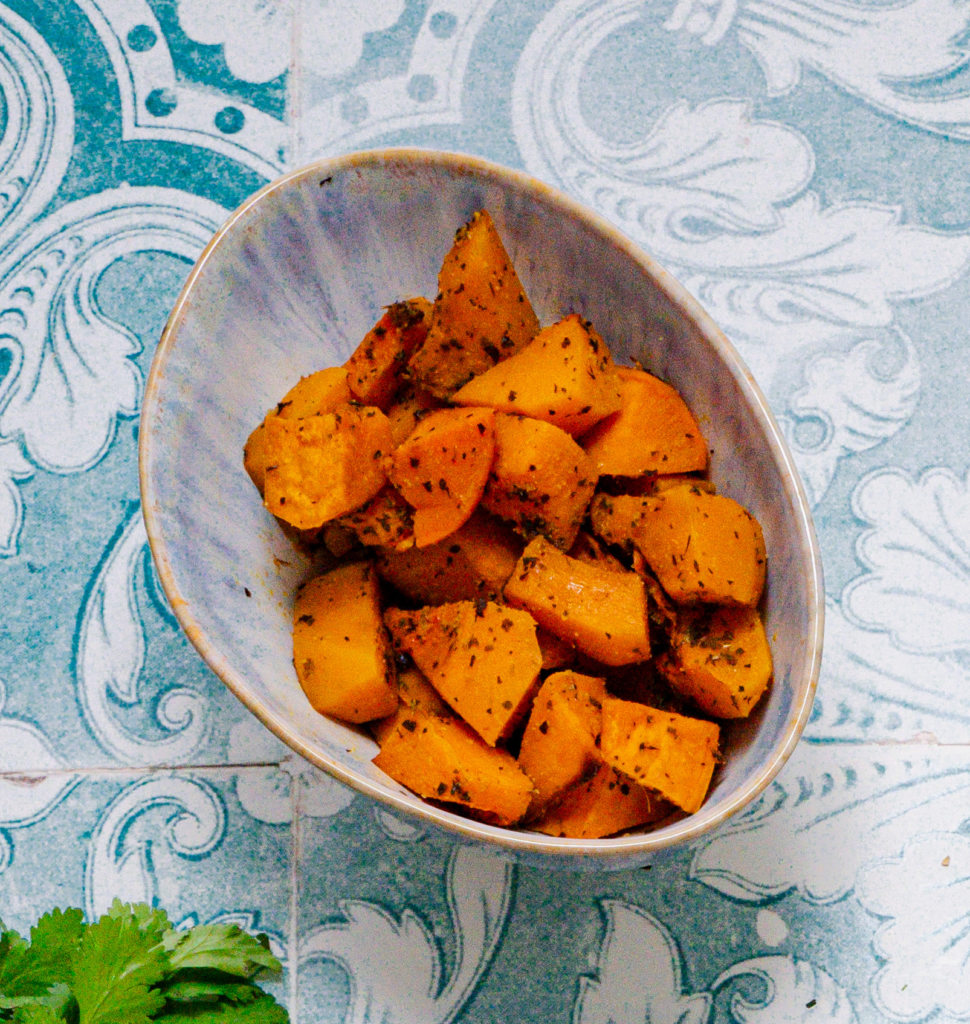
Root vegetables are a seasonal staple for Sukkot and Rosh Hashana, as well as a Pesach-friendly side and an alternative to white potatoes. These sweet vegetables are also ideal for Rosh Hashana, where we have the custom to eat sweet foods for a “good and sweet new year,” and we eat gourds such as squash as one of the Simanim, representing our desire that, if it be Hashem’s will, that the evil of our verdicts be torn apart, and that our merits be announced before Him.
Sweet and Sour Fish Tacos
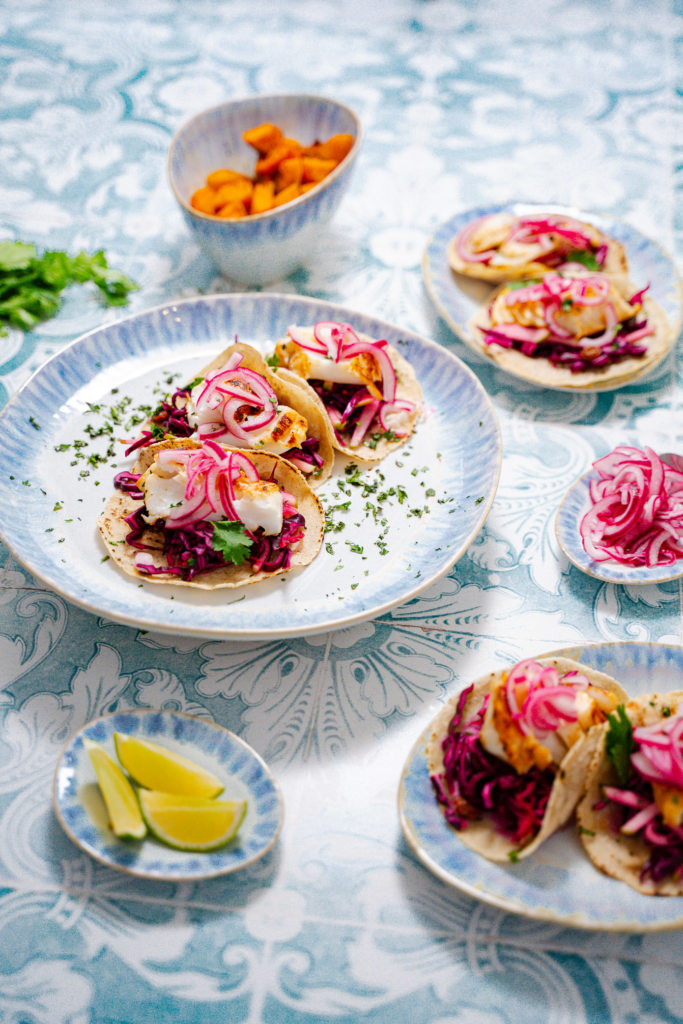
Another contemporary twist on a traditional dish, these tacos are inspired by the Italian-Jewish custom of eating sweet and sour fish for Rosh Hashanah. Pesce All’Ebraica (lit. Jewish Fish) is normally made with fillets of white fish cooked in oil, honey or sugar and vinegar, and flavoured with raisins or sultanas and toasted pine nuts.
We have seasoned our fish with South American flavours of agave and lime, bringing sugar and vinegar into the dish with pickled onions, and throwing juicy sultanas and tart green apples through a crunchy red cabbage slaw. All this is stuffed into homemade corn tacos for the perfect mouthful. (N.B. You will require a tortilla press for the tacos. If you haven’t got the time, equipment or patience to make your own corn tortillas, you can use store-bought flour tortillas, or forego the wraps altogether and serve as a plate of fish and salad with chips!)
